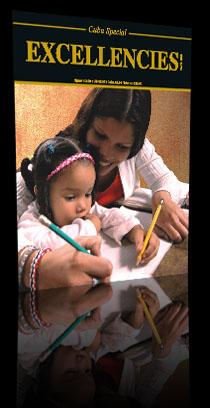Abelardo Moreno, Cuba’s Deputy Minister of Foreign Affairs
“The success of the Non-Aligned Movement (NOAL) has hinged on its ability to lay out concrete cooperative actions and finding common grounds on the world scenario,” says Abelardo Moreno, Cuba’s Deputy Minister of Foreign Affairs.
The revitalization of the Non-Aligned Movement, the search of common interests among its 116 member states in the international arena, and the making of concrete cooperative actions among them –especially in such fields as literacy, healthcare and power saving- are some of the goals those countries will tackle in Cuba during the upcoming 14th NOAL Summit scheduled for September 2006 in Havana.
In an exclusive interview with Special Excellences on Cuba magazine, Mr. Moreno went on to say that organizers on the island nation expect a massive turnout of at least fifty heads of state to the Havana gathering.
Malaysia holds the NOAL chairmanship through September. Now it’s going to be Cuba’s turn.
“Cuba is a founding member of the NOAL Movement because we joined the organization during the 1961 Summit, the first one ever held. Since then, Cuba has been a hands-on member in all actions and activities.
“We’ve always been certain about the impending need to have at any rate a strong political movement of southern nations, of Third World countries, strong enough to let us take our own stance on politics, economics and social development in order to be a prominent part of the current status of foreign relations.
“For many years, the NOAL fulfilled that goal. However, following the collapse of the U.S.S.R. and the Socialist bloc, the balance of power shifted dramatically in the world and the NOAL saw its political clout dwindle. As soon as Malaysia took over the chairmanship in 2003, the efforts to give the NOAL a new lease on life have been steadfast.
“As a matter of fact, that’s going to be the main theme of Cuba’s chairmanship that will stretch out till September 2009. Cuba wants to beef up the principles that rule the NOAL Movement, to identify the challenges the Movement will be putting up with over the next three years, and map out a clear-cut strategy for all member states to cope with the tough conditions of today’s world.
“We’ll also work hard to have the Summit pass a cooperation outline in the fields of literacy, healthcare and the rational use of power sources.”
Will those be concrete actions to be carried out by the NOAL Movement?
“And many more. The Movement’s members states may take concrete actions of all kind, like resolutions to be introduced at the UN General Assembly, or other actions of interest in a bid to achieve common positions in a variety of issues, like the burden of the foreign debt on the underdeveloped countries.
“If we truly want to rekindle the NOAL Movement, we need to come up with concrete actions. They are the ones that can give this organization the necessary vitality in the world scene and turn it –chiefly within the framework of the UN- into a mighty counterpart to the initiatives wielded by industrialized nations.
“In a word, our intention is to make the NOAL Movement far more proactive and less reactive. That means that we cannot focus solely on reacting to somebody else’s proposals, but also on having our own initiatives as well.”
And can that be achieved regardless of its member states’ different stances?
Regardless of the fact that the Movement is made up of countries with different development levels and huddled in different alliances, we need to make a great effort to find some common ground. The main strength of the NOAL Movement lies in its vast membership. It’s 116 countries in all, nearly two thirds of the UN’s membership. That’s no doubt our primary strength.”
Do those intentions go against the grain with other integration projects, like the Bolivarian Alternative for the Americas (ALBA)?
“On the contrary, they complement one another. ALBA encourages true cooperation among countries in Latin America and the Caribbean based on the need to give agreements a differentiated treatment depending on their development levels and resources –if we really want to give them a leg up for the benefit of all.
“If that can be done in Latin America and the Caribbean, we need to accomplish that same goal with countries from other parts of the world. What we need to do is find the right mechanisms within the NOAL and make them work.”
Don’t you believe that some might think Cuba is using the NOAL to spearhead its own foreign policy agenda?
“We don’t have any intention whatsoever –and I want to make this very clear- of using the NOAL Movement to foster our own foreign policy. What we want to do is reenergize the organization and help it carry on with its own foreign policy, which is the policy each and every member state has agreed upon.
“Cuba’s foreign policy agenda is clear and can be summed up in just a few words: solidarity, unity, justice, sovereignty, nonuse of force, no coercion, national development and independence. Each and every one of these words defines a principle, the same principles that have ruled Cuba’s foreign policy since the 1959 Revolution.
“We must also say that Cuba is completely against terrorism because we consider it an illegal, illegitimate and unjustifiable action. In fact, we’ve been one of the greatest victims of terrorist actions. Not now, but over the past 45 years. Those have been actions planned, financed and executed by different U.S. administrations.
“We’ve made our policy very clear in many world scenarios. Cuba has its own antiterrorist act. We have signed a dozen international conventions to stave off terrorism in the world and we’re part of the Non Nuclear Proliferation Treaty. Even as we speak, there are five Cuban heroes unfairly jailed in U.S. soil for fighting against terrorism. That speaks volumes of the antiterrorist nature of our actions.”


































